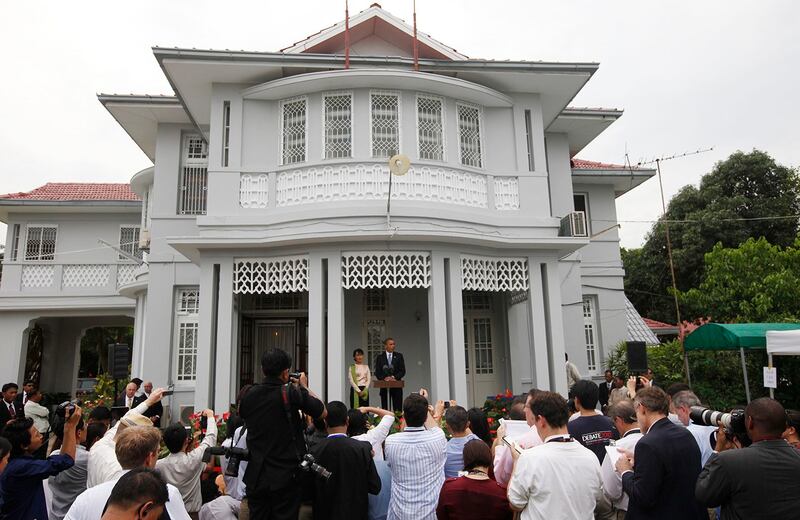A junta court-ordered auction of jailed democracy icon Aung San Suu Kyi’s historic home in Myanmar’s Yangon region concluded with no buyers, sources said Wednesday, after the bidding price was set at more than 300 billion kyats, or about US$90 million.
Critics have called the auction part of an attempt by the military regime to “obliterate the history” of Myanmar’s democratic movement, while the country’s shadow government of former civilian leaders vowed to take legal action against anyone who tries to purchase the home.
They say it should be protected as a place of cultural heritage.
The auction was held on Wednesday morning at No. 54 University Avenue in Yangon’s Bahan township, the two-acre site of the lakeside home where the deposed state counsellor spent nearly 15 years under house arrest under Myanmar’s previous military junta.
But sources close to the Kamaryut District Court, which laid out the terms for the auction, told RFA Burmese that it ended after repeated calls for bids by the auction officer were unsuccessful.
Observers had predicted that no one would pay the 300 billion kyat starting price set by the court in January.
Suu Kyi’s lawyers had lodged a petition with the Yangon District Court over the January ruling and an attorney based in the city told RFA that the outcome would determine whether another auction of the home could take place, “possibly with a revised floor price.”
If the home does not return to auction, the Kamaryut District Court will proceed with its sale on the open market in accordance with the law.
Suu Kyi, 78, is the head of the deposed National League for Democracy and the country’s former de facto leader whose government the military overthrew in a February 2021 coup, sending the country into civil war.
She is now in prison, initially sentenced by the junta to 33 years on 19 charges, a sentence that was later reduced to 27 years. The Nobel Peace Prize laureate is believed to be in solitary confinement in Naypyidaw Prison, in the capital.
In January, her son Kim Aris, who lives in the United Kingdom, received a letter from her – the first public communication from her since late 2022. Aris didn't have much to say about her health based on the letter, but she is believed to be suffering from medical and dental problems.
Family dispute
The lakeside home was awarded to Suu Kyi’s mother, Khin Kyi, after her father, independence activist Gen. Aung San was assassinated in 1947.
Granted freedom in 2010 after years of house arrest, Suu Kyi received U.S. President Barack Obama, U.S. Secretary of State Hillary Clinton and U.N. Secretary General Ban Ki-moon at the compound.

But ownership of the historic property has long been disputed by Suu Kyi and her elder brother Aung San Oo.
On Aug. 22, 2022, the junta-controlled Union Supreme Court declared the home would be auctioned under Aung San Oo's appeal.
Myanmar’s shadow National Unity Government, or NUG, on Wednesday reaffirmed its vow to take legal action if the home is auctioned or sold.
“No one wants to be prosecuted for [the junta’s] actions that are not in accordance with the law,” said Nay Phone Latt, the spokesperson of the NUG Prime Minister's Office. “Because of this, there will be no one who will bid.”
Political commentator Hla Kyaw Zaw told RFA that the junta’s attempt to auction the house is motivated by “a personal vendetta” and desire to “whitewash” the country’s history.
"No. 54 University Avenue is a symbol of Burma's democracy movement,” she said. “This is a petty attempt to erase its legacy … [and] tarnishes the reputation of General Aung San’s family.”
Translated by Kalyar Lwin. Edited by Joshua Lipes and Malcolm Foster.
